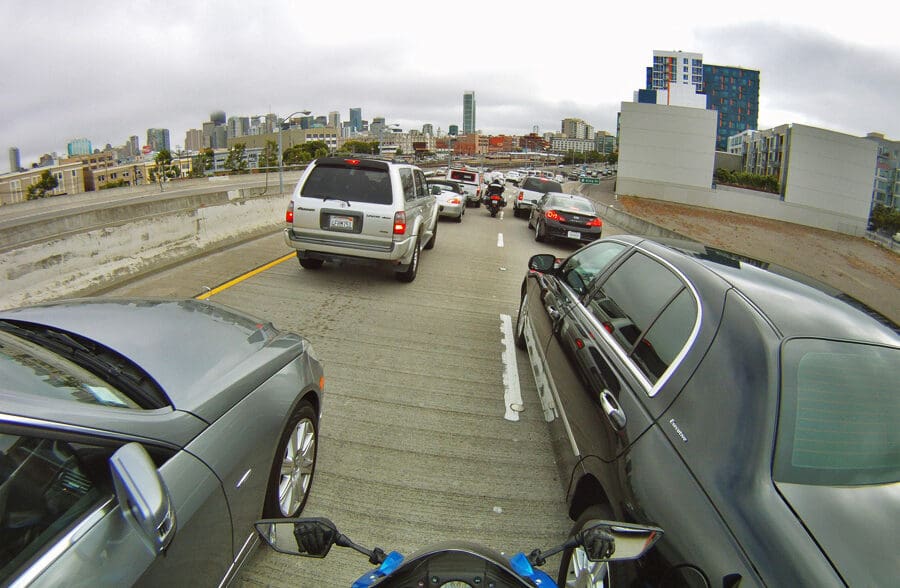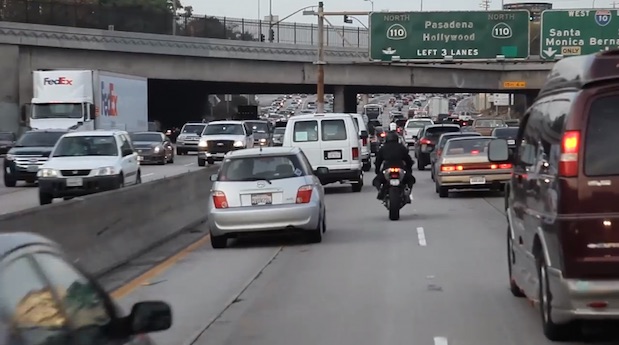(Sponsored post on lane splitting for our North American readers)
Lane-splitting is the act of riding a motorcycle between the lanes of traffic on a freeway or city road. It’s a controversial topic in motorcycle safety, with a variety of opinions and different laws on whether it benefits motorcyclists or puts them in more danger. Many riders advocate for lane-splitting, out of fear that they’ll be sandwiched between two vehicles in a rear-end accident in stop-and-go traffic. They claim it’s safer to travel between lanes, and eases traffic during a busy commute. Those against it argue lane-splitting increases the likelihood of a crash if a driver isn’t paying attention, and doesn’t notice the rider along his or her side.
Motorcycle injury attorneys at Cannon & Dunphy, S.C. claim motorcyclists face a greater risk than any other vehicle on the road. If involved in an accident, riders are are also more likely to suffer serious or catastrophic injuries. Lane-splitting has come up a lot in legislation about motorcycle safety, with a lot of gray area in different parts of the nation. So what is safer, splitting lanes or staying within the lines? A study at UC Berkeley suggests splitting reduces the likelihood a motorcyclist will be hurt in a crash, and the findings could change motorcycle laws across the country.
Lane-Splitting Increases Safety
The study, shared by the American Motorcycle Association, showed that riders who split lanes were significantly less likely to be struck from behind in a crash. Researchers reviewed nearly 6,000 motorcycle-involved collisions between 2012 and 2013. In 997 of those cases, the motorcyclist was splitting lanes at the time of the crash. Overall they found riders who split lanes were 6% less likely to suffer a head injury, 10% less likely to suffer an injury to the torso, and 1.8% less likely to die in a crash.
A few significant findings include:
- Lane-splitting motorcyclists are less likely to be rear ended than those that don’t lane split, from 2.6% to 4.6%
- Riders who lane split are 14% more likely to wear a full-face helmet and proper protective gear
- Lane-splitting is safe if the rider travels at 50 miles per hour or less, and no more than 15 miles per hour above the flow of traffic
Authors of the study cite stop-and-go traffic as the main reason motorcyclists are in danger on the road. The American Motorcycle Association agrees, stating,”reducing a motorcyclist’s exposure to vehicles that are frequently accelerating and decelerating on congested roadways can be one way to reduce rear-end collisions for those most vulnerable in traffic.”
Which States Allow Lane-Splitting?
Despite being a common practice on other continents like Australia, Europe and Asia, only California has legalized splitting for motorcyclists. California passed a bill known as AB-51 in 2017, ensuring that the practice is legal across the state.
After the bill was passed, the Governor’s Highway Safety Association released data showing an almost 30% decline in fatal motorcycle accidents since lane-splitting was legalized. The data failed to highlight a specific trend across the United States, with numbers ranging from a 66.7% decrease in Washington D.C. to a 175% increase in fatal accidents in Rhode Island. However, the national average dropped by 8.6%, 30 states saw a general decline in fatal motorcycle accidents, and there were decreases of more than 20% in 14 states.
Other states are working on their own legislation, but no other states have fully legalized lane-splitting like California. Utah has passed some legislation in May 2019, legalizing lane splitting with specific modifications for “lane-filtering”. Oregon, Washington, Connecticut, DC, and Maryland are currently considering new lane-splitting legislation as of October 2019. Many states don’t have any specific mention of lane-splitting within their legislation, meaning it’s not necessarily prohibited by law. This list includes Montana, New Mexico, Texas, Oklahoma, Arkansas, Mississippi, Missouri, Kentucky, Ohio, West Virginia, and North Carolina. All other states have laws in place to specifically prohibit lane-splitting for motorcycle riders.
As more information begins to come out about lane splitting safety, it will be interesting to see if more states choose to legalize the practice in hopes of keeping motorcyclists safer.



